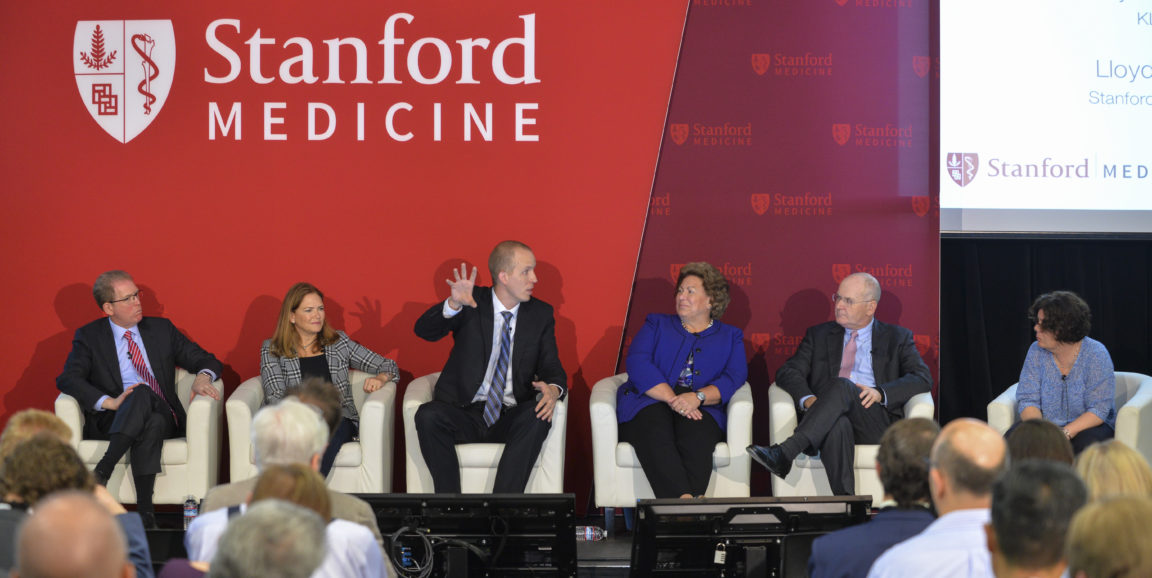At Stanford Medicine's EHR National Symposium this week, Dean Lloyd Minor, MD, encouraged attendees -- leaders in patient care, technology, design thinking and public policy -- to chart a future that fulfills the clinical promise of electronic health records while reducing the administrative burdens.
"We absolutely don't want today to be about pointing fingers or trying to assign blame," Minor said. "The goal of today's conference is to define where we are today, identify the opportunities for the future, and begin to form a road map about how we succeed in achieving those opportunities."
Featuring panel discussions and small-group problem-solving sessions, the daylong symposium touched on improving inefficiencies of EHRs, harnessing data for population health management, building on successes and overcoming obstacles.
For a baseline, Minor presented findings from a new online Stanford Medicine survey -- commissioned from The Harris Poll -- that details EHR opinions and experiences of more than 500 primary care physicians from across the United States.
Panelists at the symposium said local culture and workflow can influence whether physicians find their experience with EHRs positive or negative.
Christine Sinsky, MD, vice president of professional satisfaction at the American Medical Association, said over 16 years, she's seen expectations for digital documentation grow -- "not because the EHRs have changed but because... the expectations that every act must go through the EHR, that we translate the clinical experience into digital data for the convenience of others and not for advancing clinical care, those pressures have increased."
Taylor Davis, vice president of analysis and strategy at KLAS, a health care data and research firm, said surveys with more than 20,000 respondents found that organizations with the most satisfied workers were not the ones with cutting-edge technology, but those that emphasized teamwork, training and understanding how to use the system.
"These are organizations where physicians realize that it's a myth that the [EHR] is going to be intuitive enough that I can just pick it up and use it out of the box," he said.
Some attendees at the symposium reported using data gleaned from EHRs to inform and improve care. For example, Stanford Children's Health devised a tool that collects EHR information on cases of jaundice in premature infants. The tool analyzes the data in relation to expert-based consensus and informs best practices going forward.
Engaging patients more actively in their care has been a major benefit of electronic health records, panelists said. Through portals created for them, patients have started participating more in decision-making and care-planning, said Judy Murphy, chief nursing officer with IBM Global Healthcare. Patients now consider health care a part of life rather than as episodic encounters, she said: "That has been a huge boon to the way we think about care in the United States."
Though some attendees said providers and other health organizations are unlikely to invest in changes without a financial or regulatory incentive, others said patients, as consumers accustomed to the online retail experience, would drive innovations in electronic health records -- particularly as they assume more of the health care risk through developments like high deductible insurance plans.
A big step forward is the new Apple Health Records application programming interface, said Donald Rucker, MD, the national coordinator for health information technology at the U.S. Department of Health and Human Services. The API will allow developers to create apps that, with permission, can use electronic health records data to help individuals manage their health care, medications and more.
That empowerment of patients -- along with providers -- offers an exciting prospect for the future of electronic health records, Minor said:
I think we can dramatically improve health in America and in the world if we leverage EHRs to achieve what we inherently know they can achieve, in enabling more effective interactions between people and health care delivery systems and in enabling all of us to really be focused on value-based care.
Photo of panel from EHR National Symposium by Rod Searcey






